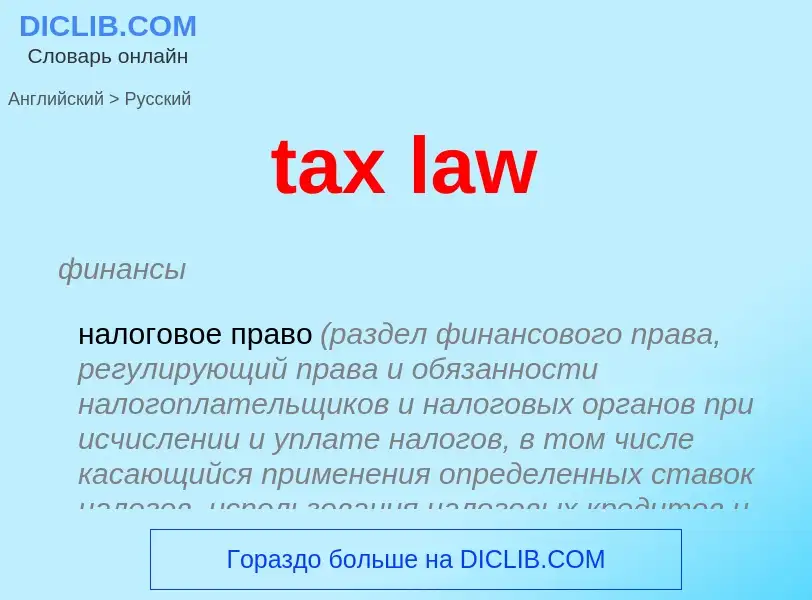Μετάφραση και ανάλυση λέξεων από την τεχνητή νοημοσύνη ChatGPT
Σε αυτήν τη σελίδα μπορείτε να λάβετε μια λεπτομερή ανάλυση μιας λέξης ή μιας φράσης, η οποία δημιουργήθηκε χρησιμοποιώντας το ChatGPT, την καλύτερη τεχνολογία τεχνητής νοημοσύνης μέχρι σήμερα:
- πώς χρησιμοποιείται η λέξη
- συχνότητα χρήσης
- χρησιμοποιείται πιο συχνά στον προφορικό ή γραπτό λόγο
- επιλογές μετάφρασης λέξεων
- παραδείγματα χρήσης (πολλές φράσεις με μετάφραση)
- ετυμολογία
tax law - translation to ρωσικά
финансы
налоговое право (раздел финансового права, регулирующий права и обязанности налогоплательщиков и налоговых органов при исчислении и уплате налогов, в том числе касающийся применения определенных ставок налогов, использования налоговых кредитов и льгот, порядка исчисления и уплаты налогов, порядка проведения налоговых проверок и т. п.)
налоговый закон (закон, вводящий налог, устанавливающий правила исчисления налога, набор льгот, налоговую ставку и т. п.)
Ορισμός
Βικιπαίδεια

Tax law or revenue law is an area of legal study in which public or sanctioned authorities, such as federal, state and municipal governments (as in the case of the US) use a body of rules and procedures (laws) to assess and collect taxes in a legal context. The rates and merits of the various taxes, imposed by the authorities, are attained via the political process inherent in these bodies of power, and not directly attributable to the actual domain of tax law itself.
Tax law is part of public law. It covers the application of existing tax laws on individuals, entities and corporations, in areas where tax revenue is derived or levied, e.g. income tax, estate tax, business tax, employment/payroll tax, property tax, gift tax and exports/imports tax. There have been some arguments that consumer law is a better way to engage in large-scale redistribution than tax law because it does not necessitate legislation and can be more efficient, given the complexities of tax law.: 213


